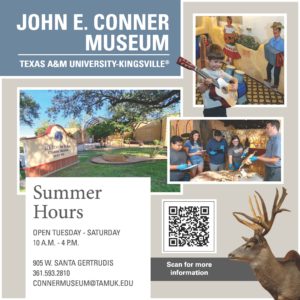Hussey says leadership is ‘taking action’
In the wake of George Floyd’s death, diversity and inclusion became an issue brought up to establishments everywhere, including at Texas A&M University-Kingsville (TAMUK), and as a result, a survey was conducted on campus to gauge the university’s atmosphere in terms of inclusion, diversity and possible discrimination. The results indicate there is some discrimination on campus.
In Spring 2021 some 7,000 students, faculty and staff received an email from Chief Human Resource Officer Henry Burgos. In this email students, faculty and staff were encouraged to participate and were provided with a single use link to take the Climate, Diversity and Inclusion Survey. The survey closed April 30. Of the 7,000 students, faculty and staff that received the survey, 686 participated.
Results from the survey were presented during last Monday’s George Floyd Social Justice Symposium.
“Advancing diversity and inclusivity efforts on campus has been one of my goals since arriving here in 2019,” TAMUK President Dr. Mark Hussey said. “This climate survey is just one part of the critical listening we do in the campus community. For example, I meet regularly with the executive teams from the Student Government Association, Staff Council and Faculty Senate. These interactions provide my leadership team and me with opportunities to learn about concerns in several areas, including any issues related to diversity and inclusivity.
“About 10 percent of our campus community responded to this survey that we shared in Spring 2021. As a result, it is difficult to conclude that the survey represents our entire campus community. However, we are taking seriously the issues highlighted in the study as part of our continuous efforts toward self-improvement,” Hussey continued.
Dr. Nirmal Goswami, professor of Political Science, presented the results of the survey and led the discussion that followed.
The survey results were broken down during the presentation with 45 percent of participants saying they are “generally satisfied” with the climate on campus, and 59 percent either “agreeing” or “strongly agreeing” that recruitment of historically marginalized students, faculty and staff is a priority of the university.
Of the 686 survey participants, 21 percent indicated they had been discriminated against or harassed on campus, at an off-campus residence or at an off-campus program/event affiliated with this institution.
If a participant’s answer indicated they had been discriminated or harassed the survey opened more questions to ask specifics.
From that, 22 percent of survey participants reported being harassed or discriminated against by faculty, 23 percent by students, 21 percent by staff, 23 percent by administration and 12 percent from the local community.
All faculty and staff are required to go through training to learn how to handle these types of situations, Goswami said.
“How the system now is, in terms of actions and opportunity it provides to faculty, is vastly different to how things were 10 to 15 years ago,” Goswami said.
Goswami has been a part of the A&M system for 32 years.
“The reason we did this survey, done by our Student Activities Board, because other universities have done it so we wanted to have access to a single data regardless of how complete or incomplete it might be, consisting with other universities. Should it be a better survey? Yes. Do we have the money to do that? At some point I might,” he said.
Hussey said university leadership is listening to concerns.
“We must always listen to our community’s concerns, and we attempt to do so through varied mediums and personal interactions,” Hussey said. “The survey results are important in helping re-affirm what we hear from the campus community. Our campus has many positive qualities that make for a welcoming and respectful environment. That’s what defines the Javelina family. In the months ahead, we plan to continue focusing on campus climate and inclusivity. This week, we hosted the University’s first Social Justice Symposium, which was a direct result of the work done by the President’s Council on Climate, Diversity and Inclusion.”
“We are listening,” he added, “and we are taking action to foster an environment of inclusivity, diversity and respect for everyone.”

